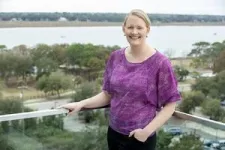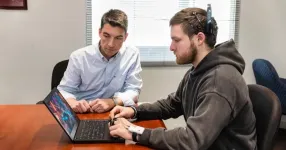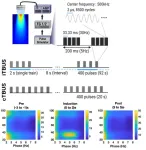(Press-News.org) Physicians and scientists have known for many years that our genetics not only shape our physical features like our smiles but also our risk for developing certain diseases.
The problem? Most people don’t know if they have inherited these genetic risk factors for disease.
In Our DNA SC, a statewide genomic screening program launched by the Medical University of South Carolina (MUSC), aims to change that.
The program, the first and only program of its kind in the Southeast, is led by Caitlin G. Allen, Ph.D., a public health researcher and co-investigator, and Daniel P. Judge, M.D., a cardiovascular genetics specialist and principal investigator of In Our DNA SC.
“Population-wide genomic screening is an innovative approach to improving population health by allowing us to identify people who are at higher risk for developing certain diseases based on their genetics,” said Allen.
Fourteen months after launching, the In Our DNA SC team has enrolled the first 20,000 participants of their overall 100,000-participant goal and published their findings to date in the American Journal of Human Genetics.
Their paper not only highlights the information provided to participants about their genetic risk factors but also shares what the researchers have learned about implementing a population-wide genomic screening program.
“It is essential that participants have as much information as possible about their genetics and their health,” said Allen. “In addition, the knowledge we gain from implementing a population-wide genetic screening program could help the community and researchers within South Carolina and beyond.”
Across the U.S., dozens of other health systems are conducting population-wide genomic screening programs for diseases.
“The growth of this type of screening has been exponential,” said Allen. “The field is shifting to gathering evidence about how to conduct these programs successfully and spread it across institutions so you’re not reinventing the wheel every time a new program is established.”
In Our DNA SC has embraced this shift, and its lessons learned from the first 20,000 participants can serve as a roadmap for future screening efforts.
Genetic risk for diseases
In Our DNA SC provides no-cost genetic screening for three conditions: hereditary breast and ovarian cancer, a hereditary colorectal cancer known as Lynch Syndrome and genetic high cholesterol or familial hypercholesterolemia.
Perhaps best-known of the mutations for which the program screens are the BRCA1 and BRCA2 gene variants, which can dramatically increase the risk of ovarian and breast cancer. Compared with a woman in the general population, those with a harmful, or pathogenic, BRCA1/2 variant have four to six times higher risk for breast cancer and 10 to 40 times higher risk for ovarian cancer. Similarly, mutations associated with the other two conditions also raise the risk of disease dramatically.
Screening for such mutations can be costly or difficult to access for those in underserved communities. Allen and Judge want In Our DNA SC to reach racial and ethnic minorities and rural residents who are often underscreened.
“We want to meet people where they are, ask them to participate in spaces with which they are familiar and really empower communities to understand the value of this type of research,” said Allen.
Power for participants
The goal of routine screening efforts, such as lab tests, mammograms and colonoscopies, is to catch a problem early. For Allen, genetic screening could join the ranks of these routine screening tests.
"We could take people who may not have a known family history for a disease and provide them with genetic testing,” she said.
Judge agrees that genetic screening could be a game changer for preventing disease.
“Knowledge is power when it comes to disease prevention,” said Judge. “We can find the genetic problem before it manifests as cancer or heart disease and intervene.”
Thanks to genetic screening by In Our DNA SC, 137 people thus far have been identified as having a variant of concern. Most of those identified agreed to be referred for genetic counseling and four out of five of those referred completed the counseling. During genetic counseling, participants learn more about the meaning of their results and discuss preventive measures.
Power for researchers
Allen and her team used implementation science, the study of how to put an intervention into practice, to develop and improve their program. Implementation science has become a vital tool for studying population health, enabling researchers to improve health outcomes and equity, optimize use of resources and make important changes to screening methods.
“Implementation science helps us to ask questions about why something worked or did not work, then make informed decisions about how to improve,” said Allen.
She is proud that it has been a centerpiece of the screening effort in South Carolina.
“In Our DNA SC is among the first population screening programs to integrate implementation science practices from the start so that it is infused throughout the whole program,” she said.
Thanks to these practices, the team realized that some of their greatest successes occurred outside the clinic. For example, community events enrolled the most racially diverse participants while at-home collection resulted in the highest rate of samples returned.
“Even the most promising programs can fail to achieve their intended impact without effective implementation,” said Allen. “By studying implementation of In Our DNA SC, we have been able to identify challenges and best practices in setting up large-scale population-based screening programs that we are excited to share with others.”
# # #
About Medical University of South Carolina
Founded in 1824 in Charleston, MUSC is the state’s only comprehensive academic health system, with a unique mission to preserve and optimize human life in South Carolina through education, research and patient care. Each year, MUSC educates more than 3,200 students in six colleges – Dental Medicine, Graduate Studies, Health Professions, Medicine, Nursing and Pharmacy – and trains more than 900 residents and fellows in its health system. MUSC brought in more than $300 million in research funds in fiscal year 2023, leading the state overall in research funding. MUSC also leads the state in federal and National Institutes of Health funding. For information on academic programs, visit musc.edu.
As the health care system of the Medical University of South Carolina, MUSC Health is dedicated to delivering the highest-quality and safest patient care while educating and training generations of outstanding health care providers and leaders to serve the people of South Carolina and beyond. Patient care is provided at 16 hospitals (includes owned or governing interest), with approximately 2,700 beds and four additional hospital locations in development, more than 350 telehealth sites and nearly 750 care locations situated in all regions of South Carolina. In 2023, for the ninth consecutive year, U.S. News & World Report named MUSC Health University Medical Center in Charleston the No. 1 hospital in South Carolina. To learn more about clinical patient services, visit muschealth.org.
MUSC has a total enterprise annual operating budget of $5.9 billion. The nearly 26,000 MUSC family members include world-class faculty, physicians, specialty providers, scientists, students, affiliates and care team members who deliver groundbreaking education, research, and patient care.
END
Unlocking health: How In Our DNA SC is pioneering genetic screening for South Carolinians
Pioneering genetic screening program enrolls first 20,000 South Carolinians and provides roadmap to guide future screening efforts
2024-02-23
ELSE PRESS RELEASES FROM THIS DATE:
Down Under Demo: ONR touts additive manufacturing tech at Australian event
2024-02-23
ARLINGTON, Va.—The Office of Naval Research (ONR) — and its international arm, ONR Global — participated in the recent Autonomous Warrior 2023 (AW23) exercise, located at HMAS Creswell in Jervis Bay, Australia.
AW23 brought together Australian military allies, as well as industry and international partners, to demonstrate various technologies designed to help the Royal Australian Navy strengthen its capabilities in the area of undersea warfare — including uncrewed (also called unmanned) and autonomous systems, artificial intelligence and machine learning, and logistics, ...
Study shows benralizumab is effective as a treatment for eosinophilic granulomatosis with polyangiitis, a rare form of vasculitis
2024-02-23
Researchers have shown that the drug benralizumab is as effective and safe as mepolizumab for inducing remission in patients with eosinophilic granulomatosis with polyangiitis (EGPA) according to a study published today in The New England Journal of Medicine. The results of the non-inferiority study were presented at the American Academy of Allergy, Asthma & Immunology annual meeting in Washington, D.C., by Michael Wechsler, M.D., pulmonologist, director of The Cohen Family Asthma Institute at National Jewish Health and lead author of the paper.
EGPA is a rare form of vasculitis, characterized by inflammation in the small blood vessels. This inflammation ...
Researchers identify new choice of therapy for rare autoimmune disease EGPA
2024-02-23
An international team, including researchers from McMaster University and St. Joseph’s Healthcare Hamilton, has identified a new therapeutic for patients with a rare autoimmune disease called eosinophilic granulomatosis with polyangiitis (EGPA). A biologic drug called benralizumab has been shown to be non-inferior to mepolizumab in the treatment of EGPA.
In a clinical trial involving 140 patients with the rare disease, researchers directly compared two biologic drugs, mepolizumab and benralizumab. Patients received monthly subcutaneous injections of either 300 mg of mepolizumab or 30 mg of benralizumab for one year. The findings of the trial were published on Feb. 23, 2024, in the New ...
Powering nitrogenases
2024-02-23
Nitrogenases are considered promising candidates for the sustainable enzymatic production of ammonia and carbon compounds. Unfortunately, one bottleneck in this complex process, the supply of electrons to the enzymes, has remained a mystery until now. Now a team at the Max Planck Institute for Terrestrial Microbiology in Marburg has discovered two essential electron carriers which play a key role in determining the performance of iron (Fe) nitrogenase, thus opening up new possibilities for elucidating and maximizing nitrogenase's potential.
Nitrogenases are catalysts for several industrially relevant ...
NJIT marketing experts measure brain waves and skin current to predict emotions
2024-02-23
Machines still can’t think, but now they can validate your feelings, based on new research from New Jersey Institute of Technology Assistant Professor Jorge Fresneda.
Fresneda started his career as a chemist and then became an expert in neuroanalytics. He studies how measurements of brain activity and skin conductance can predict a person’s emotions with high accuracy, and how such information can be used in fields such as entertainment, management, marketing and well-being.
“Neuromarketing is a subfield within marketing ...
Babies use immune system differently, but efficiently
2024-02-23
ITHACA, N.Y. – Scientists have long believed that a newborn’s immune system was an immature version of an adult’s, but new research from Cornell University shows that newborns’ T cells – white blood cells that protect from disease – outperform those of adults at fighting off numerous infections.
These results help clarify why adults and infants respond differently to infections and pave the way for controlling T cells’ behavior for therapeutic applications.
This discovery was described in a paper published in Science Immunology on Feb. 23, co-led by Brian Rudd, associate professor of microbiology ...
Cloud clustering causes more extreme rain
2024-02-23
Understanding cloud patterns in our changing climate is essential to making accurate predictions about their impact on society and nature. Scientists at the Institute of Science and Technology Austria (ISTA) and the Max-Planck-Institute for Meteorology published a new study in the journal Science Advances that uses a high-resolution global climate model to understand how the clustering of clouds and storms impacts rainfall extremes in the tropics. They show that with rising temperatures, the severity of extreme precipitation events increases.
Extreme ...
Mindfulness at work protects against stress and burnout
2024-02-23
A new study has revealed that employees who are more mindful in the digital workplace are better protected against stress, anxiety and overload.
Researchers from the University of Nottingham’s Schools of Psychology and Medicine analysed survey data from 142 employees. The results have been published today in PLOS ONE.
PhD student Elizabeth Marsh from the School of Psychology led the mixed methods study and said: “As work is increasingly mediated by digital technology we wanted to find out the impact this is having on people’s health and whether there are ways to mitigate this. We found that being mindfully and confidently digital should be considered important elements ...
Scientists closer to solving mysteries of universe after measuring gravity in quantum world
2024-02-23
Scientists are a step closer to unravelling the mysterious forces of the universe after working out how to measure gravity on a microscopic level.
Experts have never fully understood how the force which was discovered by Isaac Newton works in the tiny quantum world.
Even Einstein was baffled by quantum gravity and, in his theory of general relativity, said there is no realistic experiment which could show a quantum version of gravity.
But now physicists at the University of Southampton, working with scientists in Europe, have ...
Revolutionary brain stimulation technique shows promise for treating brain disorders
2024-02-23
The human brain's adaptability to internal and external changes, known as neural plasticity, forms the foundation for understanding cognitive functions like memory and learning, as well as various neurological disorders. New research conducted by a team led by Dr. PARK Joo Min of the Center for Cognition and Sociality within the Institute for Basic Science (IBS) unveils a novel technique that could transform the treatment landscape for brain disorders. The team developed a non-invasive brain stimulation method called Patterned Low-Intensity Low-Frequency Ultrasound (LILFUS), which holds tremendous potential for inducing long-lasting changes ...
LAST 30 PRESS RELEASES:
Breaking the efficiency barrier: Researchers propose multi-stage solar system to harness the full spectrum
A new name, a new beginning: Building a green energy future together
From algorithms to atoms: How artificial intelligence is accelerating the discovery of next-generation energy materials
Loneliness linked to fear of embarrassment: teen research
New MOH–NUS Fellowship launched to strengthen everyday ethics in Singapore’s healthcare sector
Sungkyunkwan University researchers develop next-generation transparent electrode without rare metal indium
What's going on inside quantum computers?: New method simplifies process tomography
This ancient plant-eater had a twisted jaw and sideways-facing teeth
Jackdaw chicks listen to adults to learn about predators
Toxic algal bloom has taken a heavy toll on mental health
Beyond silicon: SKKU team presents Indium Selenide roadmap for ultra-low-power AI and quantum computing
Sugar comforts newborn babies during painful procedures
Pollen exposure linked to poorer exam results taken at the end of secondary school
7 hours 18 mins may be optimal sleep length for avoiding type 2 diabetes precursor
Around 6 deaths a year linked to clubbing in the UK
Children’s development set back years by Covid lockdowns, study reveals
Four decades of data give unique insight into the Sun’s inner life
Urban trees can absorb more CO₂ than cars emit during summer
Fund for Science and Technology awards $15 million to Scripps Oceanography
New NIH grant advances Lupus protein research
New farm-scale biochar system could cut agricultural emissions by 75 percent while removing carbon from the atmosphere
From herbal waste to high performance clean water material: Turning traditional medicine residues into powerful biochar
New sulfur-iron biochar shows powerful ability to lock up arsenic and cadmium in contaminated soils
AI-driven chart review accurately identifies potential rare disease trial participants in new study
Paleontologist Stephen Chester and colleagues reveal new clues about early primate evolution
UF research finds a gentler way to treat aggressive gum disease
Strong alcohol policy could reduce cancer in Canada
Air pollution from wildfires linked to higher rate of stroke
Tiny flows, big insights: microfluidics system boosts super-resolution microscopy
Pennington Biomedical researcher publishes editorial in leading American Heart Association journal
[Press-News.org] Unlocking health: How In Our DNA SC is pioneering genetic screening for South CaroliniansPioneering genetic screening program enrolls first 20,000 South Carolinians and provides roadmap to guide future screening efforts








